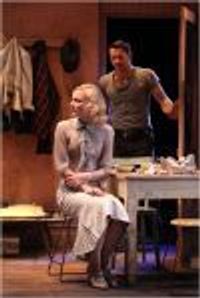The Wild Party vs. The Wild Party
#1The Wild Party vs. The Wild Party
Posted: 12/30/06 at 3:00pmWhich is the better recording? LaChiusa's or Lippa's?
- Eeyore
#2re: The Wild Party vs. The Wild Party
Posted: 12/30/06 at 3:02pmHmmmmmmmmmmm. Lippa's???? I don't know. That's my opinion.
Mattbrain
Broadway Legend Joined: 11/23/05
#2re: The Wild Party vs. The Wild Party
Posted: 12/30/06 at 3:02pmNot gonna lie to ya, dude, I have the LaChiusa version. I heard samples of the Lippa version. Go with LaChiusa.
broadwaybaby086
Broadway Legend Joined: 6/12/06
#3re: The Wild Party vs. The Wild Party
Posted: 12/30/06 at 3:07pmI got the LaChiusa first and loved it. I did the Lippa version last semester. Lippa is much more accessible, but LaChiusa is much more period-accurate. As of late, I find myself listening to Lippa's more, because I haven't felt so much like thinking while listening. And because I love Murney, Diggs, and James. But there is some serious talent on the LaChiusa as well.
Avatar: JULIE "EFFING" WHITE, 2007 TONY WINNER. Thank God. I'm thinking about legally changing my name to Lizzie Curry...
Jon
Broadway Legend Joined: 2/20/04
#4re: The Wild Party vs. The Wild Party
Posted: 12/30/06 at 3:07pmI swear to God, someone starts this topic at least once a month.
#5re: The Wild Party vs. The Wild Party
Posted: 12/30/06 at 3:08pmIf you like jazz, go with LaChiusa's.
neddyfrank2
Broadway Legend Joined: 12/23/05
Junior
Stand-by Joined: 4/12/06
#7re: The Wild Party vs. The Wild Party
Posted: 12/30/06 at 3:22pmI have both, and feel that they both have their moments, but overall I like Lippa's better. I don't know why, but sometime's LaChuisa's work just irritates me. I'm not a HUGE fan of the show(s) in general, but when I'm in the mood for it, I listen to Lippa's alot more. But I have to say, I listen to LaChuisa's just for Toni Collette. I REALLY wish she would do more Broadway and I'm still rather devastated that she's no longer in the Sweeney movie.
#8re: The Wild Party vs. The Wild Party
Posted: 12/30/06 at 3:33pmI like them both, but Lippa's is my favorite
ashley0139
Broadway Legend Joined: 1/3/05
#9re: The Wild Party vs. The Wild Party
Posted: 12/30/06 at 4:32pm
I have both, and I love both. Love the show in general. I don't think I could choose.. Plus the casts are phenomenal.
#10re: The Wild Party vs. The Wild Party
Posted: 12/30/06 at 4:45pm
Seriously, there has been like 30 threads on this. ANd that's just while I've been here.
But I've listened to both, and I prefer Lippa's.
It was awesome. - theaterkid1015
#11re: The Wild Party vs. The Wild Party
Posted: 12/30/06 at 4:57pmLaChusia's no question!
#12re: The Wild Party vs. The Wild Party
Posted: 12/30/06 at 4:59pm
Lippa's
AND
https://forum.broadwayworld.com/boardsearch.cfm?boardname=bway
#13re: The Wild Party vs. The Wild Party
Posted: 12/30/06 at 5:03pm
Ah ha! There's the search link. I've been waiting for that.
My apologies. Won't happen again.
- Eeyore
#14re: The Wild Party vs. The Wild Party
Posted: 12/30/06 at 8:53pmLippa for content. LaChuisa for jazzy/periodness.
#15re: The Wild Party vs. The Wild Party
Posted: 12/30/06 at 10:31pm
alright stupid question, but..
what is the difference between the two? lippa's and lachuisa's i mean..
don't chew me out over this question please.. =/
ashley0139
Broadway Legend Joined: 1/3/05
#16re: The Wild Party vs. The Wild Party
Posted: 12/30/06 at 10:45pmThey are two completely different shows. Both were in the 2000 season. Lippa's was Off-Broadway and LaChiusa's was on Broadway. They are two completely different musicals that happen to have the same source material (the poem, The Wild Party) and were produced in the same season.
#17re: The Wild Party vs. The Wild Party
Posted: 12/30/06 at 10:53pm
thanks ashley!
hm, that's unusual, isn't it? but very interesting though. now i want copies of the recordings!
#18re: The Wild Party vs. The Wild Party
Posted: 12/30/06 at 10:59pmGiven that I have scene neither production, and own both recordings, I do listen to Lippa's more frequently since it is more accessible and I am in love with the cast. However, as previously mentioned Lippa's version really does not hit the time period, in terms of the style of music. Try using the search feature, although I can't seem to get it to work half the time.
BSoBW2
Broadway Legend Joined: 12/8/04
#19re: The Wild Party vs. The Wild Party
Posted: 12/31/06 at 12:07am
dramaqueen (and possibly for further and future reference, I will try to be as objective as I can) -
Both are based on Joseph Moncure March's jazz-age poem of the same name. A lewd account of a party thrown by chorine, Queenie, and her clown boyfriend, Burrs. The poem was actually banned in Boston for being too risqué.
First off, I don't know Lippa's as well as LaChiusa's for the obvious reason that I prefer LaChiusa's. In fact, his musical version of the poem is one of my favorite scores (along with CAROLINE, OR CHANGE).
Lippa's follows the four main characters of the poem, Queenie and Burrs and Queenie's best friend/worst enemy, Kate, and her new shoulder candy/moocher, Black. The four, in Lippa's version, have a very defined love triangle. Or square. Or whatever shape it makes. There are various other characters that show up - the jovial lesbian, Miss Madelaine True, and the mute dancer, Jackie. It's a more contemporary look at the vaudeville era (the plays are both set in 1928, NYC). Lippa uses electric guitars and modern slang interspersed in more colloquial vaudevillian slang. The overall feeling is new-age Vaudeville - new-age meaning new millenium.
LaChiusa's, however, focuses more on the broad range of characters and how they further the themes of the relationship between the four aforementioned characters. LaChiusa uses the motif of masks and the ones we wear to hide ourselves from the world - a very worn image (worn seems too negative, but is also very adequate) that, in a retrospective way, represents the era of vaudeville in its entirety.
It was a decadent era of misfits, post-modernists, and people who exuded a sense of being debonair at its finest. It was people looking forward to each day, completely unaware of the inevitable stock market crash (1929) that was about to ruin their lives. Most of these people were performers and, as we've recently seen, the first thing to go after an economical attack is the theatre.
Each of LaChiusa's characters (as well as March's) hide themselves to get ahead. The two Jewish producers who change their names so many times that, by the end of the drunken madness they subject themselves to, has made them completely lose their sense of identity. Black, the suave moocher, protects himself by putting on a front that he is a ladies man. At the play's climax, Burrs applies black face (typical of a white vaudeville clown) before he goes to do the, in a way, inevitable.
LaChiusa's musical (I should say LaChiusa and George C. Wolfe), as well as the original poem, push the characters into a dangerous vaudeville romp that ultimately swallows each character and spits them out in a jealous rage, leaving some broken and some healed.
Lippa's musical has some great numbers - RAISE THE ROOF, OLD-FASHIONED LOVE STORY, and LIFE OF THE PARTY. Unfortunately, the play begins and ends on the same desperate tone. Behind the what seems to be called "more accessible" score is a lack of emotional depth that pushes the characters from beginning to end, creating the well-known arc of character development. Also, many of the minor characters seem to disappear and, despite their songs, become nothing more than ghosts. A theme that could have worked had it been developed as such.
LaChiusa's show has a much jazzier, vaudevillian sound, while still retaining a theatrical sense. (Although I suppose that makes sense since vaudeville is theatre.) LaChiusa's is also more operatic. While it has spoken dialogue (as does Lippa's), it relies more heavily on music. It's a party, after all. LaChiusa does a better job documenting the era in song and attitude and moving the party along. The party, however, seems to begin as quickly as it ends and that's pretty fast.
Much of the music is cut from both CDs, unfortunately - such as the Burrs/Queenie fight at the beginning of Lippa's; and NEED (a haunting lament sung by Madelaine - although it is echoed at the end of BLACK IS A MOOCHER) and Queenie's WHAT I NEED, performed at the end of the show, as well as the dance BLACK BOTTOM.
Both shows have been blessed with amazing casts - although many say that the cast of LaChiusa's often seemed to be stereotypes of the performer themself - Mandy Patinkin as the violent Burrs and Eartha Kitt as the legendary performer Dolores.
Both plays also use many of the same lines as the poem.
Updated On: 12/31/06 at 12:07 AM
#20re: The Wild Party vs. The Wild Party
Posted: 12/31/06 at 1:15amExcellent analysis, BSoBW2. I have a pretty accurate method of telling people which version they might prefer, but I was told in another thread that is was patronizing and condescending. So true, so true. In light of that, take BSoBW2's advice.
RentBoy86
Broadway Legend Joined: 2/15/05
#21re: The Wild Party vs. The Wild Party
Posted: 12/31/06 at 2:44amIt's kinda like comparing apples an oranges. Both composers took different approaches to the subject. I think they both have their pros and cons. And I think Lippa's would have definently been more successful had it opened today with the cast it had.
Broadway Legend Joined: 12/31/69
#22re: The Wild Party vs. The Wild Party
Posted: 12/31/06 at 2:48am
I'm not a big fan of Lippa and I'm a huge LaChiusa fan so there's my biase--but the LaChiusa is one of my fave cast albums of the past 10 years hands down
But I never knew until now that music was missing from LaChiusa's cd ![]()
E
actormcfamous
Stand-by Joined: 1/12/06
#23re: The Wild Party vs. The Wild Party
Posted: 12/31/06 at 3:03amI really enjoy both scores, and am a huge fan of LaChiusa. However, I have to go with Lippa. His music (though not at all period appropriate) has this rawness to it that makes it fit into the time period. And while it is not dramaturgically correct, I don't feel as though this inaccuracy is distracting or takes away from the piece - in fact, I think the modern rawness of his music makes the piece stronger.
BSoBW2
Broadway Legend Joined: 12/8/04
#24re: The Wild Party vs. The Wild Party
Posted: 12/31/06 at 3:07am
"But I never knew until now that music was missing from LaChiusa's cd"
There's actually a lot missing. Mostly internal verses.
My favorite is from UPTOWN:
Bessie Smith is lusting for
A dish of Dorothy Parker.
But Carl Van Vechten, naughty boy,
Just wants his chocolate darker
Videos









